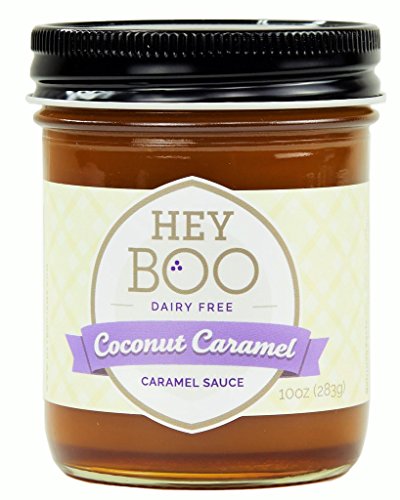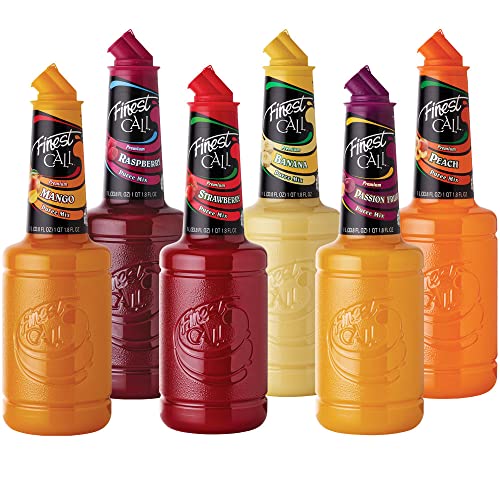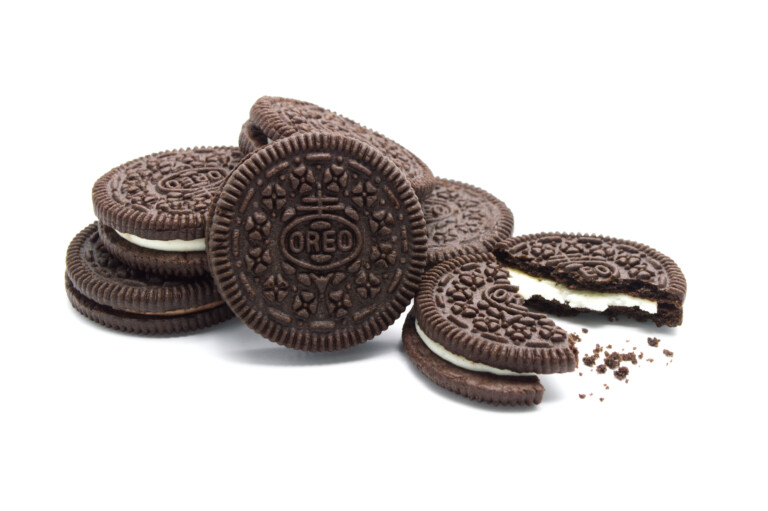Your Ultimate Vegan Guide to Caramel
Unfortunately for vegans and plant-based eaters with a sweet tooth, most caramels are NOT vegan as they are usually loaded with butter and heavy cream.
It’s also common to find additives and artificial ingredients with unrecognizable names that may contain dairy within many coffee shops or store-bought caramel products.
The good news is though, caramel can be veganized and can be just as delicious! But first…
As an Amazon Associate, I earn from qualifying purchases. The links below may be affiliate links. Please read my disclosure policy for more information.
What is Caramel?
Caramel is a sugary product made by heating a range of sugars with (usually) butter and heavy cream.
It can be used as a flavoring in puddings and desserts, as a filling in candies, or as a topping for ice cream and custard, and more recently, a popular addition to many sweet coffee drinks like Starbucks coffees.
The Process of Caramelization
Caramelization is the removal of water from a sugar by way of intense heat, this is then proceeding to isomerization and polymerization of the sugar into various high-molecular-weight compounds.
Compounds such as difructose anhydride may be created from the monosaccharides after water loss. Fragmentation reactions result in low-molecular-weight compounds that may be unstable and may contribute to flavor.
Polymerization reactions lead to larger-molecular-weight compounds that contribute to the dark-brown color of the sugar. The caramelization of sugar is the preliminary process of creating sweet treats such as fudge.
In more modernized recipes and in commercial production, glucose or invert sugar is added to prevent the sugar from crystallization, making up 10%–50% of the sugars by mass.
Wet caramels (sauces) are often made by heating sucrose and water instead of sucrose alone, and produce their own invert sugar due to thermal reaction, but not necessarily enough to prevent crystallization in traditional recipes. Adding water increases the chance of crystallization.
To achieve the exact temperature required for caramel, you must meet 320°-350°F. The higher the temperature the darker the caramel.
The History of Caramel
The exact origin of caramel is unknown, however, it was recorded that circa 1650, American settlers were making hard candies in kettles. Between this time and the early 1880’s, sweet-toothed settlers had come up with the idea of adding fat and milk to boiling sugar and water, creating what is now known as caramel.
During this time period, refined sugar was expensive to import and buy in many western countries, so candy lovers needed to be creative with what was readily available in order to chase that sugar rush.
One such option was sugary beetroot juice…
Fun Fact:
Did you know that the Godfather of chocolate, Milton Hershey, is actually technically the Godfather of caramel?
His first company was, in fact, Lancaster Caramel Company, and Hershey actually discovered chocolate while grafting ideas for candy coatings for this company. He later sold this company to The American Caramel Company for the sum of $1m, which was an unheard-of investment at the time (which was 1901).
What to Use Caramel For:
Caramel is the versatile, ever-popular sweet treat, and ways to use it include:
- Peanut Brittle
- Ice Cream Sundae Sauce
- Toffee Apples
- Salted Caramel Apple Pie
- Popcorn coating
- Caramel Heavenlies
- Cookies
- Homemade Ice Cream flavor
- Millionaire Shortbread
- S’mores
- Caramel cheesecake
- Hard candy
What is Salted Caramel?
Salted caramel is traditional caramel with small chunks of rock salt added to the mix. It was popularized back in 1977 by the French pastry chef and chocolatier Henri Le Roux and has since become a popular confectionary item.
It combines the heady sweetness of sugar, the creaminess of the heavy cream, and adds a salty hint, as well as additional crunch, and is well-loved by those with a palate that enjoys sweet and savoury mixes.
Vegan Caramel
Like most things nowadays, caramel can be veganized and can be created at home using just five simple ingredients.
Ingredients:
- 1/2 cup vegan butter of choice
- 1 cup light brown sugar, packed
- 1/2 cup agave nectar (or maple syrup or Stevia)
- 1/3 cup full-fat coconut milk or coconut cream
- 1/4 teaspoon sea salt (optional)
- 1 teaspoon vanilla extract (optional)
- Tahini (optional)
What You’ll Need:
- A rimmed baking sheet (9-inch square pan will work) with parchment paper or a silicone baking mat.
- A medium-sized pot
- A candy thermometer (it’s not recommended to attempt to do it by eye)
Method:
Whisk in the agave syrup/Stevia and full-fat coconut milk. Bring the mixture to a boil and continue to cook while continually stirring until the candy thermometer reaches 235°F.
This usually takes about 10-15 minutes. Remove the pan from the heat and stir in the sea salt and optional vanilla extract.
Pour the caramel into the cookie sheet container. Allow the caramel to cool/set before slicing and store covered in your fridge.
You can serve it as square candy by cutting it into smaller pieces from the baking tray, or you can melt it and use it as a caramel sauce.
Can Starbucks Caramel Drinks Be Vegan?

The good news for lovers of Starbucks sweet coffees is that yes, they can be veganized.
Naturally, Starbucks have been serving plant-based milk alternatives for some time, some of which include oat milk, almond milk, coconut milk and soy milk. Their hot and iced teas are also plant-based.
The good news is most of the foundations of Starbucks’ standard menu are vegan. Just add your plant-based milk of choice.
Most of the syrups are suitable for vegans, but double-check with your server if the syrups are vegan if you’re ever unsure about any new items. Be mindful that while the syrups are usually fine, the sauces often aren’t plant-based.
Starbucks have also started including vegan cakes to their menus too.
The Best Dairy-Free Caramel Sauce Brands

Sometimes a delicious caramel-coated apple is just too difficult to turn down in the fall months, so if you’re craving some cruelty-free caramel but don’t have the time (or patience) to make it from scratch, the good news is there are plenty of dairy-free caramel alternatives available, including:
Ingredients: cane sugar, coconut cream, water, contains less than 2%: sea salt, double fold vanilla extract (water, alcohol, organic vanilla bean extractives), sunflower lecithin, citric acid.
Ingredients: coconut milk, organic sugar, tapioca syrup, inverted sugar, sea salt, cream of tartar. Contains nuts (coconut).
Ingredients: organic blue agave (agave tequiliana), organic rice milk powder, and organic flavors.
Ingredients: pure cane sugar, corn syrup, water, caramel flavor, caramel color, modified corn starch, salt, potassium sorbate (preserves shelf life).
Ingredients: coconut milk (coconut cream, filtered water), cane sugar, coconut sugar, sea salt, natural vegan flavor, calcium carbonate.
Ingredients: purified water, vegetable fiber, cellulose gel, sucralose, xanthan gum, salt, food color, caramel flavor, natural flavors, lactic acid, potassium sorbate, sodium benzoate, beta carotene, FD&C yellow #6, FD&C yellow #5, vanilla flavor. *contains trace calories
Ingredients: cane sugar, tapioca syrup, water.
- BioVegan Karamell Dessert Sauce
Ingredients: raw cane sugar, caramel (24%) (cane sugar, water, tapioca starch, thickener: xanthan gum), glucose syrup*, coconut milk* (15%), water, waxy maize starch, thickener: guar gum. *from controlled organic cultivation. May contain traces of almonds, mustard, and soy.
- Tribe Sea Salt Caramel Hummus
Ingredients: cooked chickpeas (chickpeas, water), sunflower oil, sugar, rice milk powder (rice, salt, sunflower oil), light brown sugar (cane sugar, cane syrups), tahini (ground sesame), sea salt, natural flavor, vanilla extract, nisin (added to preserve freshness), caramelized sugar. contains: sesame.
- La Vida Vegan Protein Caramel
Ingredients: sunflower oil*, rice protein concentrate* 22.5%, dried glucose syrup*, inulin powder*, rice syrup powder*, low fat cocoa powder* 5%, cocoa butter*, emulsifier: lecithin*, caramel* 0.5% (sugar*, water), caramel flavouring*, bourbon vanilla powder*. * = verified organically grown.
Other Delicious Vegan Candies
Sometimes nothing beats a good, nostalgic sugar rush from one of our favorite childhood candies, but as most vegans are unfortunately aware, most classic candies aren’t vegan-friendly.
Oftentimes, they include ingredients such as gelatine, shellac glaze (which is made from beetle wings), carmine dye (red pigment made from the crushed female cochineal insect) and other ingredients that aren’t ethical. But it’s not all doom and gloom.
Many candies these days cater to vegan requirements, some of which include:
- Cracker Jacks, Original Recipe
- Hubba Bubba Chewing Gum
- Twizzlers
- Jolly Ranchers, All Standard Flavors
- Mamba Fruit Chews
- Sour Patch Kids
- Swedish Fish
- Skittles
- Dots
- Wonka Fun Dip
- Bottle Caps
- Pixy Stix
- Blow Pop Lollipops
- Smarties
- Sweet Tarts
- Sugared Popcorn
- All ‘Vegan Candy’ products
- All ‘Candy Kittens’ products
- Charms Blow Pops
- Chick-O-Stick
- Dum Dums
- Fireballs
- Pez
- Air Heads
- Annie’s Organic Fruit Snacks
- Dandies Vegan Marshmallows
- Red Vines
- Sweet & Sara Marshmallows
Please note, as discussed in our ‘Is Sugar Vegan?’ article, not all types of sugar can be considered vegan. It is therefore the responsibility of the reader to make their own inquiries with the manufacturers of these suggested vegan friendly alternatives to determine whether the sugar used in these products are suitable for vegan consumption.
Healthy Dairy-Free Candy Alternatives
Sweet (and vegan) treats don’t necessarily need to be packed with sugar and e-numbers to be enjoyable, right? If you agree, we’ve compiled a list of sweet treat ideas that are healthy (and still vegan), some of which include:
- Homemade Vegan Cookies and Bars
- Peanut Butter Chocolate Chip Cookie Bars
- Vegan Peanut Butter Cookies
- No Bake Cookies
- Tahini Almond Cookies
- No-Bake Oatmeal Bites
- Apple Oatmeal Cookies
- Pistachio Oat Squares
- Oatmeal Breakfast Cookies
- Vegan Date Brownies
- 3-Ingredient Vegan Ice Cream
- Avocado Chocolate Pudding Pops
- Creamy Butternut Squash Pudding
- Vegan Raspberry Cheesecake
- Tart Cherry & Mint Sorbet
- Vegan Pumpkin Pie Parfaits
- Vegan Peach Cobbler
- Vegan Strawberry Crumble
- Chocolate Chip Zucchini Bread
- Pumpkin Cake with Cream Cheese Frosting
- Banana Bread
- Cinnamon Rolls
- Vegan Lemon & Blueberry Muffins
- Chopped and baked strawberries
Plant-Based Sugar Alternatives
Many vegans take issue with refined cane sugar, which is filtered in a filtration machine that is then cleaned with a product containing animal bone char.
While the final product contains no animal compounds, this still isn’t considered ethical practice for a lot of vegans and plant-based eaters. The good news is there are alt-sugar options available that are both ethical and sustainable. They are:
Maple syrup is a thick, sweet liquid that is made by cooking the sap of maple trees.
It is a more healthier and nutritious sugar substitute and contains small amounts of minerals, including calcium, potassium, iron, zinc, and manganese. It’s also rich in phenolic compounds, like lignans and coumarins, that may have anti-inflammatory and antioxidant effects.
Despite this, maple syrup is still very high in sugar. It has a slightly lower GI than regular sugar, but, like any sweetener, should be enjoyed in moderation.
Stevia is a natural sweetener that has derived from the leaves of the South American shrub by the name of Stevia rebaudiana.
This plant-based sweetener can be extracted from one of two compounds called glycosides — stevioside and rebaudioside. What’s more, these compounds don’t contain any calories, are up to 450 times sweeter than regular sugar, however, they may taste slightly different than sugar.
Molasses is a sweet, brown liquid with a thick, syrup-like texture. It’s made from boiling sugar cane or sugar beet juice.
It contains a handful of vitamins and minerals, as well as several antioxidants. Furthermore, it’s a good source of the minerals iron, potassium, and calcium, which are important for many aspects of health.
Again, despite these benefits, molasses should not be consumed in excess.
Replacing sugar with purées is a good way to reduce your refined sugar intake. All fruits offer health benefits due to their nutrients.
Unlike refined sugar, fruit is generally linked to a variety of health benefits, including a reduced risk of chronic diseases. Obviously, if you buy applesauce or other fruit purées from the store, be sure to select unsweetened products with no added sugar.
Conclusion
So while traditional caramel isn’t vegan-friendly, there are clearly multiple other options available to enjoy, as well as numerous other ways to get that sugar fix. We can hope that in the near future more and more sweet treats will gear themselves towards a more ethical, sustainable, and cruelty-free production.
















